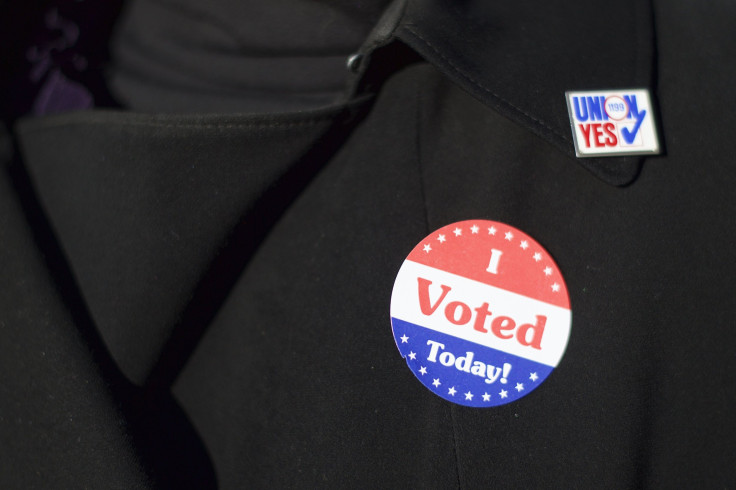What Is Pointergate? Twitter Mocks Outrage After Minnesota Mayor Poses For A Picture With A Felon

#Pointergate was trending on Twitter Friday morning as people across the United States reacted with outrage and humor to what some are calling "the most racist news story of 2014." The controversy revolved around Minneapolis Mayor Betsy Hodges, who posed for a photo with a black campaign volunteer before Tuesday's midterm elections. In the picture, Hodges and the man, Navell Gordon, pointed at each other.
The situation blew up when local news channel KTSP broadcast a story Thursday night asserting that Hodges and Gordon were flashing gang signs. Gordon is a felon, twice-convicted, on drug selling and firearm possession charges. He is under supervised probation until 2016.
For the past two years, Gordon has been a member of Neighborhoods Organizing for Change, a Minnesota charity aimed at fighting for racial and economic justice for low-income residents. Last weekend, the organization's volunteers canvassed in Minneapolis along with the mayor and police chief, Janee Harteau.
The problem came when they took the photo. By posing with Gordon and pointing, Hodges was publicly endorsing gang activity, retired city police officer Michael Quinn told KTSP. Pointing was known as a gang sign on the north side of the city, KTSP reported, and several law enforcement officers were furious. "She is legitimizing these people," he said. "She is legitimizing gangs who are killing our children in Minneapolis, and I just can't believe it. It hurts."
A spokeswoman for the mayor told KTSP Hodges was just "pointing at him."
Critics responded with outrage of their own. Daily Kos reporter Shaun King wrote that "Sadly, only racism allows such an ugly story and stereotype to be advanced about a young man who was clearly not flashing a gang sign with the mayor of Minneapolis. He deserves a public apology and heads should roll at this station for even allowing it to ever make it to the air."
Nekima Levy-Pounds, the founder of the Community Justice Project, condemned the news story in an editorial published by the Minneapolis Star-Tribune. She called KTSP's reporting "a Kafkaesque moment" that preyed on white Minnesota residents who did not know anything about black men. "Rather than celebrating the young man’s involvement in civic engagement, the media decided to replay an age-old narrative of stereotyping a young black man from the inner city and branding him as a gang member," she wrote. "Because of the mayor’s willingness to reach into the community and build connections, she too was labeled in a similar manner and accused of having gang affiliations."
Both King and Levy-Pounds raised concern about why the Minneapolis Police Department was backing the KTSP story. They surmised the motivation could be discontent after Hodges recently suggested law enforcement reforms, like a project requiring officers to wear body cameras.
Others took to Twitter to express their discontent with the allegations by posting pointing photos tagged #pointergate. See below:
God and Adam flashing gang signs. #pointergate pic.twitter.com/HpgVtBh7fp
— Guante (@elguante) November 7, 2014OMG I am in a gang with a bald eagle #pointergate pic.twitter.com/pwPoBVzVwQ
— Kevin Hoffman (@panopticon13) November 7, 2014Stephen Colbert the original gangster #pointergate pic.twitter.com/icQzOSfSAV
— seanote11 (@seanote11) November 7, 2014Presidential Thugging #pointergate pic.twitter.com/GgyIylsDOP
— Genesia (@niqsanddimes) November 7, 2014OMG My dog's in a gang??? #pointergate pic.twitter.com/wUdorWu5aP
— Julie Tilsen (@Julietilsen) November 7, 2014My wife and I throwing "gang signs" at the family reunion. Sorry. #Merica #pointergate pic.twitter.com/294WLdRUYD
— Scott Harves (@scottharves) November 7, 2014My 7-month-old daughter flashes gang sign at @Twins game. #pointergate pic.twitter.com/WvmGueuYsv
— Daniel Sellers (@dsellers22) November 7, 2014What????? I had no idea the Trumpster was in a gang. Thanks for "pointing" this out to me @KSTP. #pointergate pic.twitter.com/eryJGEcM4O
— oregon_girl (@oregon_girl3) November 7, 2014.@KSTP clearly a gangsta cat. May be owned by mayor. Suggest you check it out. Or just publish. @deray #pointergate pic.twitter.com/5mbf764oba
— ActivistAnnie (@AnarchistAnnie) November 7, 2014BREAKING NEWS: via @KSTP and @JayKollsKSTP POPE FLASHES GANG SIGN. #pointergate pic.twitter.com/yPAIuHwTla
— atom robinson (@atomrobinson) November 7, 2014© Copyright IBTimes 2024. All rights reserved.






















